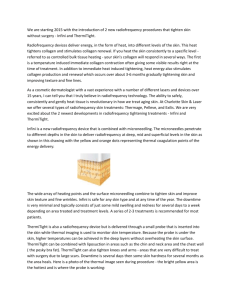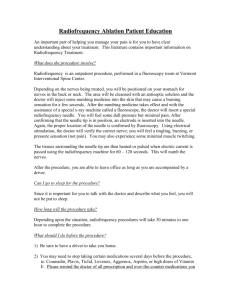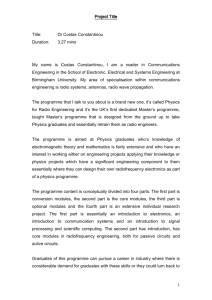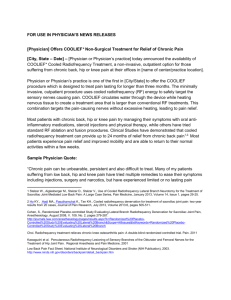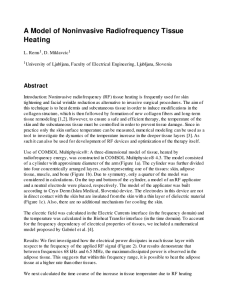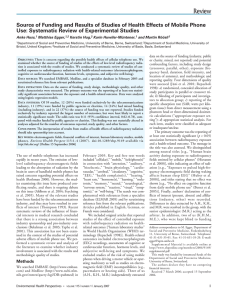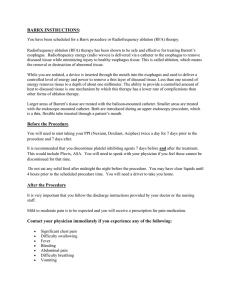ELECTROMAGNETISM SUMMARY ® Maxwell`s equations
advertisement
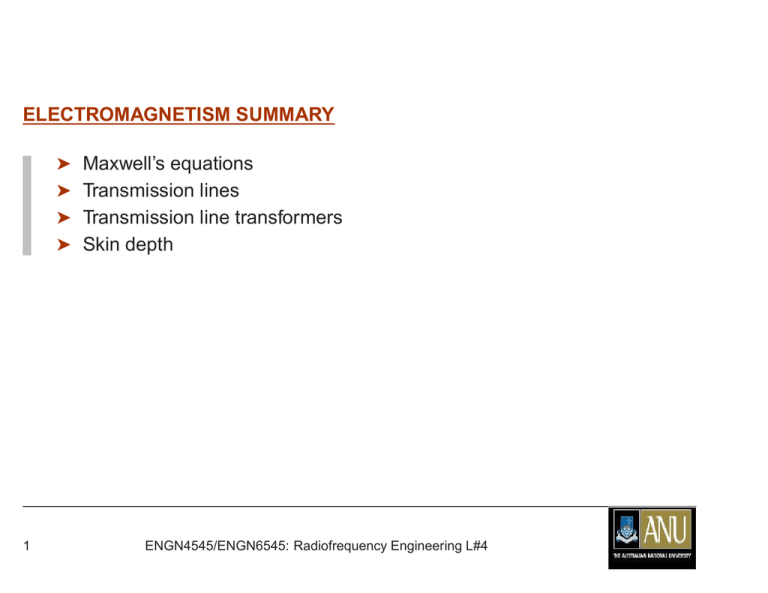
ELECTROMAGNETISM SUMMARY ➤ ➤ ➤ ➤ 1 Maxwell’s equations Transmission lines Transmission line transformers Skin depth ENGN4545/ENGN6545: Radiofrequency Engineering L#4 Magnetostatics: The static magnetic field ➤ Gauss’s law for the magnetic field: I B.dA = 0 A ➤ There is no static sink or source of the magnetic field. Also generally true. ➤ However current is the source of a static magnetic field, I B.dl = µ0I γ The line integral of B around a closed circuit γ bounding a surface A is equal to the current flowing across A. Ampere’s law 2 ENGN4545/ENGN6545: Radiofrequency Engineering L#4 Important Correction to Ampere’s Law ➤ A time varying Electric field is also a source of the time varying magnetic field, I γ 3 B.dl = Z A ! ∂E .dA µ0 j + ǫ0 ∂t ENGN4545/ENGN6545: Radiofrequency Engineering L#4 Faraday’s Law ➤ The law of electromagnetic induction or Lenz’s law ➤ A time varying magnetic field is also the source of the electric field, I γ 4 E.dl = − Z A ∂B .dA ∂t ENGN4545/ENGN6545: Radiofrequency Engineering L#4 Maxwell’s Equations: Integral Form ➤ Gauss’s law for the electric field. Charge is the source of electric field: I A q E.dA = ǫ0 ➤ Faraday’s law. A changing magnetic flux causes an electromotive force: I Z ∂B E.dl = − .dA ∂t γ A ➤ Gauss’s law for the magnetic field. Magnetic fields are source free: I B.dA = 0 A ➤ Ampere’s law: I γ 5 B.dl = Z A ! ∂E .dA µ0 j + ǫ0 ∂t ENGN4545/ENGN6545: Radiofrequency Engineering L#4 Transformers ➤ Combining the effects of self and mutual inductance, the equations of a transformer are given by, V21 = jωL1Ii + jωM Io V43 = jωM Ii + jωL2Io 6 ENGN4545/ENGN6545: Radiofrequency Engineering L#4 Transmission Lines 7 ENGN4545/ENGN6545: Radiofrequency Engineering L#4 The Planar Transmission Line: Identical to the plane EM wave ➤ Same derivation as for plane waves (but include a dielectric)... 8 ∂E = iωB ∂z − Integral over γ iω ∂B = 2E ∂z v − Integral over ζ ENGN4545/ENGN6545: Radiofrequency Engineering L#4 The Planar Transmission Line ➤ From the definition of potential difference and Ampere’s law we obtain µo I V = Ed and B = w ➤ Substitute these in the differential equations for E and B. ∂E ∂V iωµod = iωB => = I ∂z ∂z w iω ∂I ∂B = 2 E => = ∂z v ∂z ! iωw V 2 µodv ➤ For sinusoidal dependence V, I = exp i (±kz − ωt) s 1 ω = ±v = ± k µoǫoǫr s µovd µo d V =± =± I w ǫoǫr w 9 ENGN4545/ENGN6545: Radiofrequency Engineering L#4 The Planar Transmission Line ➤ For a wave travelling in one direction only, the ratio of V to I is a constant ➤ For a given wave, the ratio |V /I| is referred to as the Characteristic Impedance. ➤ The planar transmission line is also called a stripline. ➤ For the stripline: Zo = s µo d ǫoǫr w ➤ Note that the characteristic impedance can be complex if the dielectric material separating the conductors is lossy (has finite loss tangent). ➤ In the latter case the propagation speed is also complex. 10 ENGN4545/ENGN6545: Radiofrequency Engineering L#4 The Telegraphist Equations ➤ We can rewrite the above equations as (Telegraphist Equations) ∂V iωZo = I ∂z v iω ∂I = V ∂z Zo v ➤ See the equivalent web brick derivation in terms of the inductance and capacitance per unit length along the line. ➤ The Telegraphist Equations become Zo ∂V = iωLI, L = ∂z v ∂I 1 = iωCV, C = ∂z Zo v 11 = µo d w ǫoǫr w = d ENGN4545/ENGN6545: Radiofrequency Engineering L#4 The Telegraphist Equations ➤ The velocity and characteristic impedance of the line can be expressed in terms of L and C. v= s 1 LC Zo = s L C ➤ L and C are the inductance and capacitance per unit length along the line. ➤ For coaxial cable the formula is quite different (a,b inner, outer radii). 2πǫoǫr C= ln(b/a) Zo = 12 s 2πln(b/a) L= µo µo ln(b/a) ǫoǫr 2π v= s 1 µoǫoǫr ENGN4545/ENGN6545: Radiofrequency Engineering L#4 Reflection Coefficient ➤ Consider a wave propagating toward a load ➤ In general there is a wave reflected at the load. The total voltage and current at the load are given by, Vload = Vf + Vr Iload = If + Ir where Vf = ZoIf 13 Vr = −ZoIr ENGN4545/ENGN6545: Radiofrequency Engineering L#4 Reflection Coefficient ➤ At the load, ZL Vf − Vr Vload = ZLIload = ZL If + Ir = Vf + Vr = Zo ➤ Solving for ρ = Vr /Vf , we obtain, ρ= ZL − Z o ZL + Z o ➤ ρ is the reflection coefficient. ➤ If ZL = Zo there is no reflected wave. ➤ A line terminated in a pure reactance always has |ρ| = 1 14 ENGN4545/ENGN6545: Radiofrequency Engineering L#4 Impedance Transformation Along a Line ➤ Consider a transmission line terminated in an arbitrary impedance ZL. ➤ The impedance Zin seen at the input to the line is given by ZL + jZo tan kL Zin = Zo Zo + jZL tan kL ➤ If ZL = Zo, then Zin = Zo. ➤ If ZL = 0, then Zin = jZo tan kL ➤ If ZL = ∞, then Zin = Zo/(j tan kL) 15 ENGN4545/ENGN6545: Radiofrequency Engineering L#4 Voltage and Current Transformation Along a Line ➤ Consider a transmission line terminated in an arbitrary impedance ZL. ➤ The voltage Vin and current Iin at the input to the line are given by Vin = Vend cos kL + jZoIend sin kL V Iin = Iend cos kL + j end sin kL Zo ➤ If a line is unterminated then the voltage and current vary along line. 16 ENGN4545/ENGN6545: Radiofrequency Engineering L#4 Transmission Line Transformers ➤ One way to make 180o Hybrids. ➤ Transformers and transmission lines are equivalent at Radiofrequency! 17 ENGN4545/ENGN6545: Radiofrequency Engineering L#4 Rules for Transmission Line Transformers ➤ Always wind the windings in multifilar fashion. ➤ Can use either toroidal or linear or whatever shaped ferrites. Toroidal ferrites are usually the best. ➤ The dot on the transformer diagram points to one end of the wires at one end of the transformer. ➤ The voltage drop across all windings must be same. WHY? ➤ The currents in the same direction in the windings must sum to zero. WHY? ➤ Respects phase delays along the transmission line when doing its sums? 18 ENGN4545/ENGN6545: Radiofrequency Engineering L#4 Transmission Line Transformer 180o Hybrid 19 ENGN4545/ENGN6545: Radiofrequency Engineering L#4 The Linear Phase Shift Combiner. 20 ENGN4545/ENGN6545: Radiofrequency Engineering L#4 The Magic-T (Wilkinson) ➤ The magic-T is a three port device that uses lossiness in order to achieve reciprocity and matching. 21 ENGN4545/ENGN6545: Radiofrequency Engineering L#4 The Magic-T (Wilkinson) 22 ENGN4545/ENGN6545: Radiofrequency Engineering L#4 Skin Depth ➤ Electromagnetic waves, j, E, B, ... only penetrate a distance δ into a metal. Check the magnitude of δ in lab and web exercises. ➤ The wave equation for metals simplifies to... ∂ 2Ey (z) = jωσµ0 Ey (z) 2 ∂z ➤ The solution... 1 + j Ey (z) = exp − z δ ➤ where δ the skin depth is given by... δ= 23 s 2 ωσµ0 ENGN4545/ENGN6545: Radiofrequency Engineering L#4 Skin Depth 24 ENGN4545/ENGN6545: Radiofrequency Engineering L#4 Impedance per Square ➤ By integrating the formula for the electric field inside a metal, 1 + j z Ey (z) = exp − δ to find the current per unit width Is we defined the impedance per square as s 1 + j πµ0f = (1 + j ) σδ σ ➤ For a wire of radius, a, length L and circumference 2πa, we obtain Zs = Ey (0)/Is = Z= 25 L Zs 2πa ENGN4545/ENGN6545: Radiofrequency Engineering L#4
